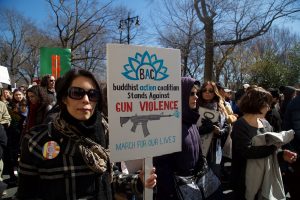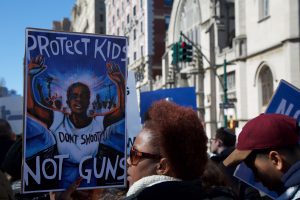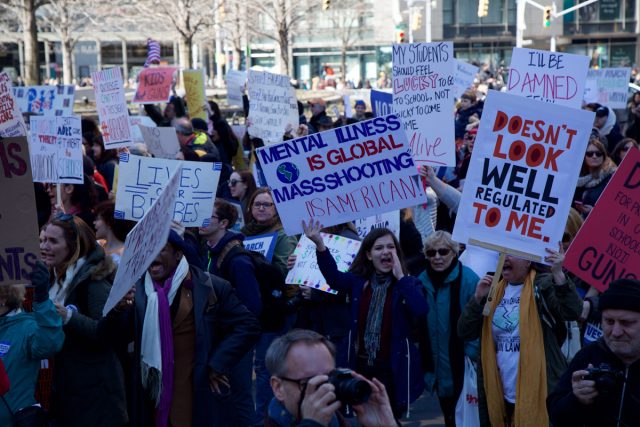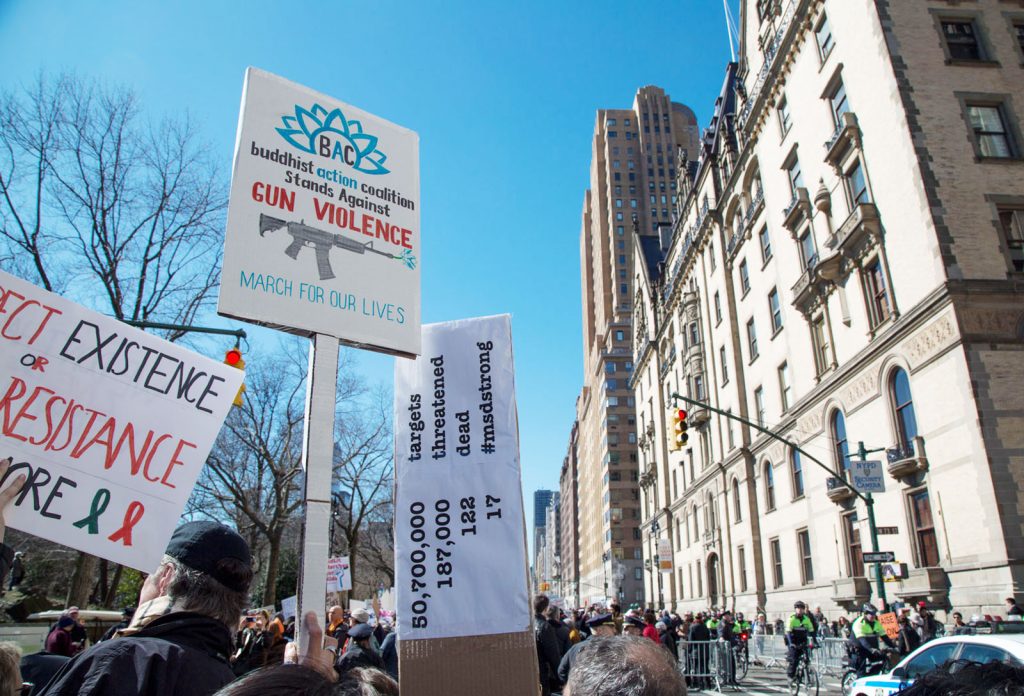Many New York-based Buddhist groups could be spotted in the massive crowds declaring “Never again!” at the international March for Our Lives on Saturday, March 24. Organized by students who survived the February 14 shooting at Marjory Stoneman Douglas High School in Parkland, Florida, that killed 17 people, the march drew more than 1.2 million people in the US and inspired rallies at over 800 locations worldwide. New York City Mayor Bill de Blasio’s office estimated 175,000 demonstrators marched in Manhattan.
With calls to action from non-sectarian Buddhist activist groups like the Buddhist Council of New York, Compassion NYC, and the recently formed Buddhist Action Coalition, several independent sanghas arrived at Central Park West and 72nd Street on Saturday morning ready to demand social change. Participating sanghas included the Zen Center of New York City (the city branch of Zen Mountain Monastery, also known as the Fire Lotus Temple), Brooklyn Zen Center, the Village Zendo, New York Insight Meditation Center, New York Zen Center for Contemplative Care, Chan Dharma Community, and Won Buddhism of Manhattan.
“There are some people who have the idea that to be Buddhist means to not have an opinion or to not get involved [in social engagement]. To me, that’s the furthest thing from the truth,” said Regina Valdez, the founder of Compassion NYC, an offshoot of Pali translator and monk Bhikkhu Bodhi’s international charity organization, Buddhist Global Relief.

“We just knew that we had to get out there and do something,” Valdez said.
Roshi Pat Enkyo O’Hara, the abbot of Village Zendo, marched with her sangha on Saturday, saying her reasoning was threefold.
“First, I wanted to support all the youth who organized and participated in the march and who, I am hoping, will be willing to work for positive change in our political system,” Enkyo Roshi said. “Second, I wanted to stand up against the monetization of guns—the suspension of all common sense gun regulations in the pursuit of financial gain. And third, I wanted to stand against all gun violence, whether by police or others.”
Rebecca Li, dharma heir in Master Sheng Yen’s Dharma Drum Chan Buddhist lineage, explained in a statement first written for the Buddhist Action Coalition why she, too, felt compelled to participate.
“We march because it is a natural response to our concern for our fellow human beings who have suffered unnecessarily due to the rampant presence of highly potent weapons among civilians,” Li said in the statement. “We march because we have been paying attention to the development of this phenomenon over the years and can see that something is seriously wrong, that our society has chosen to prioritize the rights of corporations to profit from selling guns over everyone’s longing to live without fear of unnecessary gun deaths and injuries.”

Related: What is the Mindful Response to a School Shooting?
Echoing March for Our Lives’ posters calling for more than just “thoughts and prayers” from politicians, Li added that “it is not enough to pray or dedicate our chanting or meditation, in private or within our centers or temples.”
For the Buddhist demonstrators, their decision to participate in the march was deeply tied to their religious aspirations and vows.
Valdez said, “The Buddha walked all over India to spread the dharma. He didn’t just sit in one place in the woods alone and meditate. So to me, how are we to say, ‘Well, the Buddha walked for years to help people, but we’re just supposed to sit in our temples and our meditation halls and practice metta for ourselves?’ It becomes very self-serving.”

Thank you for subscribing to Tricycle! As a nonprofit, we depend on readers like you to keep Buddhist teachings and practices widely available.
